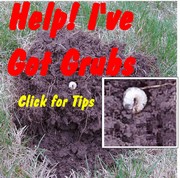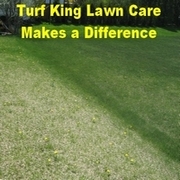A long term strategy- shade the lawns. The judicious use of tree can enhance your enjoyment of your yard and reduce chinch bug damage. Choose trees with filtered shade (such as Honeylocusts) that will still allow grass to grow reasonably well underneath. Trees like maples will eventually make it difficult to grow grass beneath them as their shade is much more intense.
If you have a lawn/tree/shrub that needs some Tender Loving Care- get The KING OF GREEN:
or call us at 905.318.6677 or 1.888.TURFKING (887.3546)
If you would like more information, please Contact us
Follow us on Twitter http://twitter.com/turfkingofgreen
Copyright 2012 Turf King-Hamilton. All Rights Reserved.
Grubs are starting to be found in lawns by late August. If the lawn has been brown or dead since July, it is more likely to have been caused by chinch bugs.
- Animals digging in the lawn
- Dead or dying patches of lawn
- Feed the lawn to help any surviving lawn to recover and to fill in the damage.Good quality fertilizer is important to help the lawn fill the spaces where the roots have been eaten by the grubs
- Keep an eye on moisture levels. Since grubs feed on the roots, the lawn will be under stress. When there is a lot of rainfall, the damage is less severe.
- Repair any damage by seeding. See seeding options below.
- Consider applying nematodes next season to prevent as much damage as possible.
The grubs do survive the winter. The animals may be back next spring, but I would not recommend treating at that time. Nematodes could technically be used in the spring once the soil warms up. Even when chemical insecticides were available, I normally did not recommend treating for grubs in the spring.
If you have a lawn/tree/shrub that needs some Tender Loving Care- get The KING OF GREEN:
or call us at 905.318.6677 or 1.888.TURFKING (887.3546)
If you would like more information, please Contact us
Follow us on Twitter http://twitter.com/turfkingofgreen
Copyright 2012 Turf King-Hamilton. All Rights Reserved.
| Lawn care company marks 50 years in business | |
| Written by Mike Jiggens | |
| An Ontario lawn care company with franchises established throughout the province is celebrating its 50th anniversary this year. Turf King is headquartered in Barrie and has franchises serving areas of Ontario from as far north as Sudbury and North Bay, in the southwest to the Lake Huron and Georgian Bay areas, and in southern Ontario in the Hamilton and Haldimand regions. The company’s roots were in the United States where it was previously called General Lawn Spray. It had maintained an office in Canada and billed itself at the time in the early 1960s as the largest lawn care company in the world. The manager of the Canadian branch had originally lived and worked out of the Orillia-Barrie area. The parent company eventually figured there was no money to be made in Canada, and the Canadian office was sold to a businessman who hired a sod grower to become its manager and chief operator. In 1986, Ken and Maureen purchased the Turf King Barrie franchise and, four years later, he became owner and franchisor of Turf King, establishing his Barrie location as head office. Ken remains today as CEO of the company. With a degree in agriculture at the time he joined the company, Murray said his knowledge of turfgrass was a little sketchy. “I knew absolutely nothing about lawns so I learned from him (the former sod grower who served as previous owner) and used my degree to my advantage.” Ken grasped lawn care in short order, ultimately teaching lawn care to professionals at Georgian College for 10 years. Shortly after he bought out the Canadian head office of Turf King in 1990, he turned to his longtime friend Gerry for help in running the company. The two go back to their years as teenagers, having been roommates in school and serving as each other’s best man at their respective weddings. Their wives are also best friends with each other. Gerry, whose background is in horticulture and who began in the industry working at his father’s garden centre in Mount Hope, became the franchisee of Turf King’s Hamilton operation in 1991. “I knew Gerry’s background was considerably more suited for something like this,” Ken said, adding his friend is one of the smartest and most trustworthy people he’s ever met. Ken said there are a number of reasons to explain Turf King’s success over the course of 50 years. For starters, he said the company is “a family-type operation.” Company meetings are held twice yearly, including an annual barbecue each summer. “Everyone’s opinion is valued,” Ken said. “Even though it is a franchise organization, we operate as one large team.” In the event he encounters a problem, he said he can count on any one of his franchisees to lend a helping hand. Another reason for Turf King’s success was its forward thinking toward alternate pest control products several years prior to the implementation of the Ontario cosmetic pesticide ban. “We didn’t jump on the bandwagon for banning pesticides, but we explored every single alternative we could find along the way. We tried things long before they were acceptable.” Turf King began experimenting with corn gluten meal long before it became an approved alternative product. “We try to be innovative,” Gerry said. ken said he would approach his customers with ideas for controlling pests without the need for traditional products which have since become outlawed. He told his customers that if the alternative products didn’t work to their satisfaction, that he could revert to the tried and true conventional products still available at the time for use. “Most of my customers were good with that idea,” he said. “They liked the idea of being avant garde.” Those customers, he said, were integral in allowing the company to see which products were effective and which weren’t in advance of the ban. Gerry said it is important for Turf King to be up front with its customers in the years since the implementation of the ban, letting them know that the products available for legal use don’t work quite the same as those banned. The customers are educated with an understanding of what Turf King is up against. “You don’t want to lower their expectations, but let’s say manage their expectations,” Gerry said. The company has lost some customers in recent years because the alternative pest control products aren’t working as effectively as 2,4-D and others which fell to the ban, and they are costlier than their predecessors. But other customers are coming back, he said, because they feel the newer products are sufficiently effective and aren’t as environmentally harsh. Gerry said he has a healthy percentage of repeat customers, some of whom date back to his days about 30 years ago when he worked at Oriental Garden Gallery in Mount Hope (now called Mountain Garden Centre). Turf King has introduced a 50th anniversary special this year to attract new customers. Gerry, who supervises six technicians in a territory which covers Oakville to Beamsville to Haldimand, said he believes that, politically, it would be difficult for the ban to be repealed, but added it could one day be amended to include certain products taken away. In the meantime, educating his customers is a priority. “We try to educate them with their expectations,” he said. “I’d rather be a little more up front with people and say it will kill some and some will take several applications, and there’s probably some it won’t control.” To Gerry, it’s a matter of treating customers the way he’d like to be treated. Among his customers within the Hamilton territory include seniors who are unable to tend to their lawns anymore themselves, high-end residential customers “who can afford not to do it anymore,” condominiums, commercial properties and sub-contracted work for landscape contractors. Some franchises offer more or different services than others, but the Hamilton franchise specializes in strictly weed and insect control, fertility and deep root feeding. Other franchises may offer tree and shrub care in addition to basic lawn care services if a specialist in that field is among that franchise’s technicians. Ken himself, in addition to his administrative responsibilities at company CEO, likes to get his hands dirty and does much of the field work himself for his own Barrie-area franchise. Gerry said a good working relationship over the years with supply companies such as Nutrite has proven to be a success for Turf King. At Turf King’s request, Nutrite has done such custom blending as a fertilizer and grub control combination product to meet the customer’s needs prior the pesticide ban. Ken said Nutrite “treated us like kings when we were more like paupers,” adding he suspects Turf King may now be among Nutrite’s largest customers. The use of a good, high-quality fertilizer is “the backbone of your program and gives you a good, healthy lawn and gives you a good start,” Gerry said. Hiring the right people is the key to a successful franchise, Gerry said, adding he has had good staff retention for the past four or five years. Some other lawn care companies will have crews of about three people at a job site, one of whom is the foreman. Turf King sends one technician to a job site. Gerry said he prefers to hire technicians who are knowledgeable in their trade, trustworthy, dependable and who can work independently. Ken said the time has come to consider growing the company. Turf King currently has 10 franchises in Ontario, employing about 50 people. He said he purposely kept the number of franchises to a manageable level because he liked the collective family atmosphere it represented. “But, in our business, if you don’t grow, you die,” he said. |
Turf King #Lawncare company marks 50 years in business - Turf & Recreation http://ht.ly/bTlN4
If you have a lawn/tree/shrub that needs some Tender Loving Care- get The KING OF GREEN:
or call us at 905.318.6677 or 1.888.TURFKING (887.3546)
If you would like more information, please Contact us
Follow us on Twitter http://twitter.com/turfkingofgreen
Copyright 2012 Turf King-Hamilton. All Rights Reserved.











